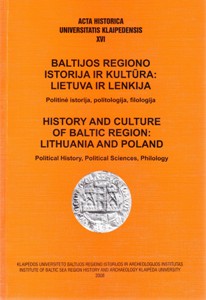Volume 16 (2008): Baltijos regiono istorija ir kultūra: Lietuva ir Lenkija. Politinė istorija, politologija, filologija = History and Culture of Baltic Region: Lithuania and Poland. Political History, Political Sciences, Philology, January 2008

Order by:
Pub. online: 15 Jan 2008
Type: Introduction
 Open Access
Open Access
Journal:
Acta Historica Universitatis Klaipedensis
Volume 16 (2008): Baltijos regiono istorija ir kultūra: Lietuva ir Lenkija. Politinė istorija, politologija, filologija = History and Culture of Baltic Region: Lithuania and Poland. Political History, Political Sciences, Philology, pp. 5–8
Pub. online: 15 Jan 2008
Type: Article
 Open Access
Open Access
Journal:
Acta Historica Universitatis Klaipedensis
Volume 16 (2008): Baltijos regiono istorija ir kultūra: Lietuva ir Lenkija. Politinė istorija, politologija, filologija = History and Culture of Baltic Region: Lithuania and Poland. Political History, Political Sciences, Philology, pp. 9–20
Abstract
Pub. online: 15 Jan 2008
Type: Article
 Open Access
Open Access
Journal:
Acta Historica Universitatis Klaipedensis
Volume 16 (2008): Baltijos regiono istorija ir kultūra: Lietuva ir Lenkija. Politinė istorija, politologija, filologija = History and Culture of Baltic Region: Lithuania and Poland. Political History, Political Sciences, Philology, pp. 21–29
Abstract
Pub. online: 15 Jan 2008
Type: Article
 Open Access
Open Access
Journal:
Acta Historica Universitatis Klaipedensis
Volume 16 (2008): Baltijos regiono istorija ir kultūra: Lietuva ir Lenkija. Politinė istorija, politologija, filologija = History and Culture of Baltic Region: Lithuania and Poland. Political History, Political Sciences, Philology, pp. 31–40
Abstract
Pub. online: 15 Jan 2008
Type: Article
 Open Access
Open Access
Journal:
Acta Historica Universitatis Klaipedensis
Volume 16 (2008): Baltijos regiono istorija ir kultūra: Lietuva ir Lenkija. Politinė istorija, politologija, filologija = History and Culture of Baltic Region: Lithuania and Poland. Political History, Political Sciences, Philology, pp. 41–48
Abstract
Pub. online: 15 Jan 2008
Type: Article
 Open Access
Open Access
Journal:
Acta Historica Universitatis Klaipedensis
Volume 16 (2008): Baltijos regiono istorija ir kultūra: Lietuva ir Lenkija. Politinė istorija, politologija, filologija = History and Culture of Baltic Region: Lithuania and Poland. Political History, Political Sciences, Philology, pp. 49–56
Abstract
Pub. online: 10 Dec 2007
Type: Article
 Open Access
Open Access
Journal:
Acta Historica Universitatis Klaipedensis
Volume 16 (2008): Baltijos regiono istorija ir kultūra: Lietuva ir Lenkija. Politinė istorija, politologija, filologija = History and Culture of Baltic Region: Lithuania and Poland. Political History, Political Sciences, Philology, pp. 57–66
Abstract
Pub. online: 15 Jan 2008
Type: Article
 Open Access
Open Access
Journal:
Acta Historica Universitatis Klaipedensis
Volume 16 (2008): Baltijos regiono istorija ir kultūra: Lietuva ir Lenkija. Politinė istorija, politologija, filologija = History and Culture of Baltic Region: Lithuania and Poland. Political History, Political Sciences, Philology, pp. 57–64
Abstract
Pub. online: 15 Jan 2008
Type: Article
 Open Access
Open Access
Journal:
Acta Historica Universitatis Klaipedensis
Volume 16 (2008): Baltijos regiono istorija ir kultūra: Lietuva ir Lenkija. Politinė istorija, politologija, filologija = History and Culture of Baltic Region: Lithuania and Poland. Political History, Political Sciences, Philology, pp. 65–74
Abstract
Pub. online: 15 Jan 2008
Type: Article
 Open Access
Open Access
Journal:
Acta Historica Universitatis Klaipedensis
Volume 16 (2008): Baltijos regiono istorija ir kultūra: Lietuva ir Lenkija. Politinė istorija, politologija, filologija = History and Culture of Baltic Region: Lithuania and Poland. Political History, Political Sciences, Philology, pp. 75–87
Abstract